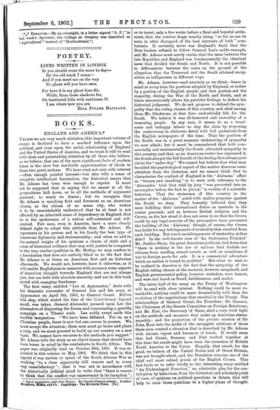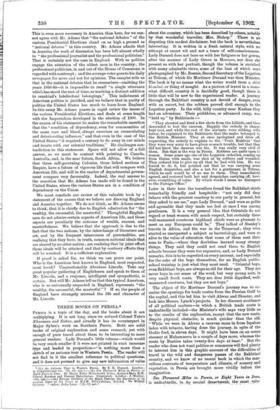BOOKS.
ENGLAND AND AMERICA.*
UNLESS we are very much mistaken, this important volume of essays is destined to have a marked influence upon the political, and even upon the social, relationship of England and the United States of America, and we trust it will be read with close and painstaking attention by all those who believe, as we believe, that one of the most significant facts of modern times is the slow but inevitable approximation of ideals in these two great nations. We have read, not only with interest —often enough painful interest—but also with a sense of complete intellectual fascination, the historical essays that Mr. Adams has been wise enough to reprint. It must not be supposed that in saying this we assent to all the propositions laid down, or to all the methods of argument pursued ; to much we demur ; but we recognise that Mr. Adams is speaking first and foremost as an American citizen, as the citizen of no mean city, who wishes it to be unmistakably understood that he at least is not affected by an inherited sense of dependency on England, that he is the spokesman of a nation self-contained and self- centred. Few men, even in America, have a more clearly defined right to adopt this attitude than Mr. Adams. He represents in his person and in his family the best type of American diplomacy and statesmanship; and when we add to the natural weight of his opinions a charm of style and a sense of historical evidence that may with justice be compared to the very similar qualities in Mr. Motley, we may confess to a fascination that does not entirely blind us to the fact that Mr. Adams is at times an American first and an historian afterwards. We would not, however, have it otherwise, as it will enable Englishmen to measure with accuracy some aspects of American thought towards England that are not always int, but are held with absolute sincerity, and are in this book stated with engaging frankness.
The first essay, entitled " Lee at Appomatox," deals with the dramatic surrender of General Lee and his army at Appomatox on April 9th, 1865, to General Grant. Before this step, which sealed the fate of the Confederacy beyond recall, was taken, General Alexander pressed upon Lee the alternative of dispersing the forces and commencing a guerilla campaign on a Titanic scale. Lee nobly swept aside this terrible temptation. " We have been defeated. For us, as a Christian people, there is now but one course to pursue. We must accept the situation; these men must go home and plant a crop, and we must proceed to build up our country on a new basis. We cannot have recourse to the methods you suggest." Mr. Adams tells the story as an object-lesson that should have been borne in mind by the combatants in South Africa. The paper was originally read on October 30th, 1901. It was re- printed in this volume in May, 1902. We think that in this reprint it was unwise to speak of the South African War as working "to a close apparently still remote and in every way unsatisfactory " ; that it was not in accordance with the historically judicial mind to write that "there is reason to think that the conflict was unnecessary in its inception " ; Los at A&Ad ether Pains. By Charles Francis Adams. London : lieligitne, and Ca Cesiabsidge : The Riverside Press. [70.]
or to insist, only a few weeks before a final and hopeful settle- ment, that the contest drags wearily along, " so far as can be seen, in utter disregard of the best interests of both " com- batants. It certainly never was England's fault that the Boer leaders refused to follow General Lee's noble example, and Mr. Adams must surely realise that the issue between the late Republics and England was fundamentally the identical issue that divided the South and North. It is not possible to differentiate between the cases on the ground of the allegation that the Transvaal and the South attained recog- nition as belligerents in different ways.
Mr. Adams, however—and unwisely as we think—bears in mind at every turn the position adopted by England, or rather by a portion of the English people, and that portion not the majority, during the War of the North and South, and at times unconsciously allows his patriotic feelings to deflect his historical judgment. We do not propose to defend the sym- pathy that the ruling classes of this country, and ohief among them Mr. Gladstone, at that time undoubtedly felt for the South. We believe it was ill-bestowed and unworthy of a reasoning people. In any case, it seems to us a weari- some and unhappy labour to slay the slain by reopening the controversy in elaborate detail with full quotations from the English newspapers of the time. That the position of the South was in a great measure undeserving of sympathy we now admit; but it must be remembered that both com- mercially and sentimentally the South attracted sympathy in this country, and that, as an American writer has expressed it, the South also got the full benefit of the feeling that always goes out to the " under-dog." We cannot but believe that what may be called the psychological aspect of the matter deserves some attention from the historian, and we cannot think that to characterise the conduct of England in the Alabama ' affair as " brazen and sneaking," or to state with reference to the Alexandra' trial that trial by jury " was perverted into an accomplice before the fact in piracy," is worthy of a scientific historian. That the statesmen of this country in the matter of the Alabama " acted with malice prepense against the North we deny. They honestly believed that they were fulfilling their international duties as neutrals in the course pursued; and as between British subjects and the Crown, as the law stood it does not seem to us that the Crown could by any legal exercise of the prerogative have prevented the building of the Alabama,' though, of course, the Crown was liable for any infringement of neutrality that resulted from such building. But was it an infringement of neutrality at that date P In the well-known case of 'La Santissima Trinidad' Mr. Justice Story, the great American publicist, laid down that "there is nothing in the law of nations that forbids our citizens from sending armed vessels as well as munitions of war to foreign ports for sale. It is a commercial adventure which no nation is bound to prohibit." But what we wish to be realised in America is the fact that the sympathy of the English ruling classes at the moment, however misplaced, and English governmental policy, however mistaken, were honest, and were not based on fraud, faithlessness, and malice.
The latter half of the essay on the Treaty of Washington will be read with close interest. Nothing could be more re- markable, nothing could be more dramatically told, than the evolution of the negotiations that resulted in the Treaty. The relationships of General Grant, the President; Mr. Sumner, the Chairman of the Senate Committee on Foreign Relations; and Mr. Fish, the Secretary of State, shed a very vivid light on the methods and manners that make up American states- manship ; and the projection of the private mission of Sir John Rose into the midst of the entangled relations of those three men created a situation that is described by Mr. Adams with intense vigour and keenness of touch. It would seem that had Grant, Sumner, and Fish worked together at this time the result might have been the accession of British North America to the Union. Happily, that result, for the good, we believe, of the United States and of Great Britain, was not brought about, and the Dominion remains one of the chief and most valued jewels of the English Crown. This fact leads us to refer briefly to the interesting essay entitled " An Undeveloped Function," an admirable plea for the con- tribution by historians, from the historical and scholarly point of view, of opinions on political questions in debate that will help to raise those questions to a higher plane of thought.
This is even more necessary in America than here, for we can- not agree with Mr. Adams that "the national debates" of the various Presidential Elections stand on as high a ground as "national debates" in this country. Mr. Adams admits that in America the work of discussion has been left almost wholly to " the professional journalist and the professional politician? That is certainly not the case in England. With us politics engage the attention of the ablest men in the country ; the professional politician, in and out of the House of Commons, is regarded with contempt ; and the average voter goes to his daily newspaper for news and not for opinions. The essayist tells us that in the national debates that he remembers—omitting the years 1856-60—it is impossible to recall "a single utterance which has stood the test of time, as marking a distinct addition to mankind's intellectual belongings." This indictment of American politics is justified, and we believe that in purity of politics the United States has much to learn from England. In this essay Mr. Adams passes in rapid review the issues of the various Presidential Elections, and deals at some length with the Imperialism developed in the election of 1900. In the coarse of his statement he makes the remarkable assertion that the "condition of dependency, even for communities of the same race and blood, always exercises an emasculating and deteriorating influence," and that even in the case of the United States " it required a century to do away in our minds and hearts with our colonial traditions." He challenges con- tradiction to this statement. Space will not allow of a full answer, so we must be content with pointing to Canada, Australia, and, in the near future, South Africa. We believe that these self-governing Colonies, these linked sections of Empire, have a. future of vigorous life that will compare with American life, and will in the matter of departmental govern- ment compare very favourably. Indeed, the real answer to the assertion that Mr. Adams has made will be found in the United States, where the various States are in a condition of dependency on the Union.
We must conclude our review of this valuable book by a statement of the causes that we believe are drawing England and America together. We do not think, as Mr. Adams seems to think, that it is chiefly due to English admiration for " the wealthy, the successful, the masterfuL" Thoughtful English- men do not admire certain aspects of American life, and those aspects are peculiarly the outcome of wealth, success, and masterfulness. We believe that the approach is due to the fact that the two nations, by the interchange of literature and art, and by the frequent intercourse of personalities, are realising that they have, in truth, common national ideals that are shared by no other nation ; are realising that by joint effort those ideals will be attained and that by contrary efforts they will be wrecked. It is a sufficient explanation.
If proof is asked for, we think we can prove our point. Who is the American best known in England, most respected, most loved ? Unquestionably Abraham Lincoln. Take any great popular gathering of Englishmen and speak to them of Mr. Lincoln, and a response, intelligent and sympathetic, is certain. But will Mr. Adams tell us that this typical American, who is so universally respected in England, represents "the wealthy, the successful, the masterful" ? If so, the people of England have strangely misread the life and character of Mr. Lincoln.







































 Previous page
Previous page